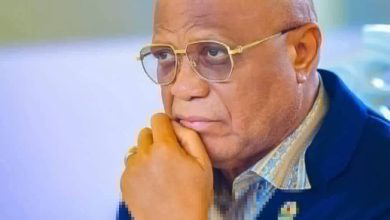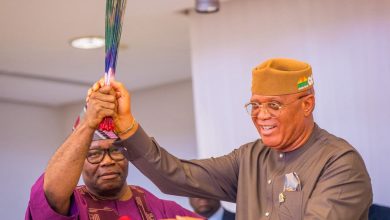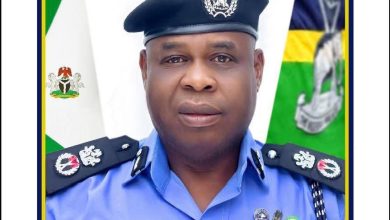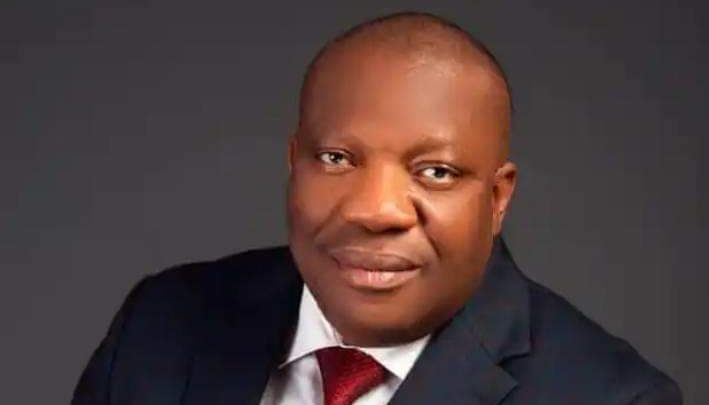
Senator Ekong Sampson (PhD) is a journalist, writer, lawyer and politician. His foray into politics has seen him serve his people as Executive Chairman of Mkpat Enin Local Government Council and Member Representing Mkpat Enin State Constituency in the Akwa Ibom State House of Assembly. Ekong, a cerebral administrator was appointed into the State Executive Council of Akwa Ibom State and held offices as Special Adviser on Political and Legislative Affairs and later as Commissioner for Environment and Petroleum Resources.
A member of the Peoples Democratic Party (PDP), Ekong is currently in the Senate, representing the Akwa Ibom South Senatorial District. In this Interview, he speaks on Akwa Ibom State at 36, his impression of Governor Umo Eno’s 100 days in office and offers his opinion on the way forward for Nigeria if the nation must advance desirably. He also speaks on other trending issues. Excerpts:
Thirty-six (36) years after the creation of Akwa Ibom State, will you say it is a successful or failed state?
Akwa Ibom at 36 is a success story. We remain grateful to the then President Ibrahim Babangida who created Akwa Ibom State. Akwa Ibom is a remarkable state, well discussed in Nigeria and beyond. There is no way you can discuss Nigeria of today without mentioning Akwa Ibom State as we continue to pay tributes to our founding fathers who worked over the years for the creation of our dear state, till Akwa Ibom became a dream fulfilled. Generally, ours is a success story and not a failed state.
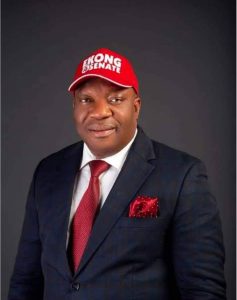
How would you describe her leaders from creation? Do you think they contributed enough?
Every leader who has piloted the affairs of the state brought something to the table from Colonel Tunde Ogbeha to the incumbent governor, Pastor Umo Eno. Perspectives may differ but in all, everyone brought something to the table.
Colonel Tunde Ogbeha came as a military administrator with its set milieu and standards but today we are in a democracy. The fact remains that there are tremendous changes in the landscape. Someone who visited Uyo in 1987 and returns today will miss their way. Akwa Ibom State has transformed and moved with time. The state has changed in outlook and aesthetics. The Akwa Ibom person has earned respect in Nigeria through their enterprise. A few minutes ago, Mr John Obot turned a fresh page about Akwa Ibom’s resilience by performing the longest marathon reading for the Guinness World Record. Also, not long ago, Hilda Baci turned her page through a cook-a-thon.
Therefore you find in an Akwa Ibom person the resilience, the type you found in late Philip Effiong, Clement Isong, Egbert Udo Udoma, the type of resilience that made Vincent Enyeama one of the best goalkeepers we have had in Nigeria. We are also very hospitable and richly endowed.
I represent Akwa Ibom South in the Senate and we are very proud of our diversity of Oro, Ibibios, Ekid and Obollos. We have oil and gas, arable lands and some of the finest brains you can find on the face of the earth. So Akwa Ibom is rich in content and the future can only get better and the future beckons on Akwa Ibom State. Our future is bright as a state.
Today you are representing the oil-rich Akwa Ibom South and in the Senate, there are complaints of neglect from oil-bearing communities over poor treatment from international oil companies (IOCs}. How do you hope to handle this?
We are going to sustain pressure on the authorities until we get our dues. Akwa Ibom South is richly endowed and the missing link which has contradicted the Nigeria scenario is that the centre takes away so much from the federating units, which is one concern that must be addressed. The multinationals encourage divide and rule, pitch the people against themselves and get them short-changed. The people have to be more alert and also unite more, stop infightings which are vices that distract them from the focal point of the struggle. Thankfully the endowments are there in the form of mineral resources and manpower, all we need to do is harness them and maximize profits.
I am coming on board as a bridge-builder in clearly the most diverse segment of Akwa Ibom State. I am representing a pluralistic segment of the Akwa Ibom community. During my campaign, I made it clear that I would build bridges of unity and ensure that their rights and interests are well protected. I will open my senatorial office in Eket on September 21 and this is to ensure that my people have adequate representation and achieve the needed cohesion so that we can get our dues in Nigeria. If you fail to unite for your purpose in today’s Nigeria, then you will be outsmarted.
Related: Pastor Umo Eno Assumes Office As A’Ibom Governor
Talking about sustaining pressure on the oil firms, does it include the agitation for the relocation of their headquarters to the state?
They have no basis for operating outside our state. Why should we produce and not get commensurate benefits from our endowments? The multinationals must establish and maintain a visible presence in their area of operations. It has been my position since my days as Commissioner for Petroleum in this state.
I made it very clear then that oil companies must have a visible and impactful presence in their areas of operations. And one way to have this presence is to have their headquarters in their areas of operations. This will help to drive the local economy and it will also help them cut costs operating within the key areas of their operations. What they are doing now is depriving the oil-bearing communities of their rights. Why can’t they relocate to their operational bases? I have been consistent in that agitation over the years.
Information has it that you are floating four constituency offices across your senatorial district which none has done before now. Why?
Well, my position has been that a representative must be seen and heard. He must connect with his people. I am opening four offices, one in Eket which is the headquarters of the senatorial district, one in Ikot Abasi, one in Oron and one in Uyo. The idea is that accessibility is key to democracy. My constituents should be able to access me so that I can listen to their demands, feel their pulse and take steps to attend to their needs. For instance, I am committed to employment for the teeming youths of the Akwa Ibom South. When you facilitate employment, you are creating a strong future for the people. They have to see and relate their concerns to me through the offices. So these liaison offices make accessibility easier for people. Those in Eket, Ikot Abasi, Oron and Uyo need not travel but get to the offices nearest to them and convey their messages. With that, nobody will complain about not accessing their senator. I am a very visible and accessible person and enjoy service to humanity. This is a new approach am bringing to representation. In my office, I have a special desk for employment for Akwa Ibom South people and have a staff dedicated to handling employment cases. The idea is that I will comb every nook and cranny of Nigeria to fetch jobs for Akwa Ibom South people. I will comb everywhere including the creeks and deserts to ensure that the people of Akwa Ibom South are employed in both the private and public sectors in Nigeria and even outside the country. We are in the era of globalization and there is nothing wrong in getting jobs for my people beyond the shores of Nigeria. So I have a special desk on employment in my office and it is just focused on getting jobs for people, patronages, empowerment and others to alleviate poverty.
The empowerment has always been cars, motorcycles, and starter packs for some level of skills training. Are they part of your shelve?
They are part of the components. Training is key. If you are hoping to make a lasting impact on their lives, training must be accommodated. When people are trained, more they are marketable. Training is key and with assistance, they will stand on their feet.
What are your views on Pastor Umo Eno’s administration after 100 days in office?
I made it clear during the campaigns that Pastor Umo Eno is going to give Akwa Ibom State strong security and a strong economy. When you get the economy right, you get other vulnerable right too. I have been very consistent in saying that a weak economy puts pressure on democracy. When you have a strong economy, you are putting a safety belt for a strong democracy. Pastor Umo Eno is a humane and compassionate leader who connects with the people. These have attracted more people to him and his administration. People see him as an accessible, visible and simple leader. Some will call it street governor because of his activities and he is cutting down the cost of governance. His roadmap for rural development makes a lot of sense to me. I had served earlier as Commissioner for Rural Development in the state where I conceptualized the Akwa Ibom rural development master plan whose major key was rural security. The one singular factor threatening our progress is insecurity. Nobody wants to come near your area if it is not secure, just like nobody would want to employ a sick man. Through that master plan on rural development, I embedded in it rural security. So I found it reassuring that our governor is taking rural development very seriously. It is on record that 70 per cent of our state is rural and we need to create modern villages, and balanced interventions in our rural areas so that the rural populace can have more access to infrastructure. As the then Commissioner for Rural Development, I was passionate about the establishment of rural villages and having an agreeable metrical infrastructure that touch everybody in the rural space. We need to ensure that an average villager has access to electricity, potable water, education, health care, good roads and decent functions of living. Governor Umo Eno’s attitude to rural development is the game-changer and if properly implemented we will have clear indices to improve our rural space.
How do you see the new leadership in the country and the way we are going?
Well, we have lost touch which is the truth. We are not supposed to be where we are in Nigeria today. I have traversed a wide spectrum in governance from councillor to the Senate. Nigerians are very observant now and there is a need for all of us to do proper soul-searching to see how we can rescue Nigeria. We don’t deserve to be where we are now. The missing link is that we have not learned enough from history. We behave like those scared by what happened to Lot in the Bible. We don’t look back. We need to do a lot of introspection, we need to see if we can recover lost grounds and we need to play politics based on policy because, for a long time, we have allowed politics to define policy.
When politics takes centre stage over policy, there is a violent clash in value. But when we allow policy to drive politics, we find an aggregation of principles that helps us to advance as humanity. We can be as sophisticated as the First World countries and advanced democracies if we get it right. Regrettably, largely misplaced sentiments are our bane. We place lots of emphasis on sentiments and not reasoning. There are Nigerians both in high and low places who are more loyal to tribes than the country. Some Nigerians are more loyal to religion than the country, while some are more loyal to money than the country. We must put the country first and leave the sentiments that are holding us down. Imagine a country where people avoid soul-searching and it shouldn’t be so. We should all look at the bigger picture which is national interest. When I say national interest, I don’t mean what looks like national interest. Sometimes people approximate national interest to their narrow interest. National interest respects the larger picture, the bigger goals we need to fill the gaps.


